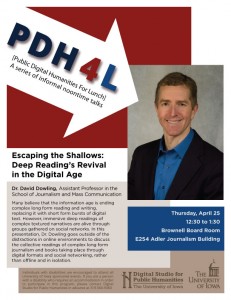Crossposted from my HASTAC blog; you can find my original post here at the HASTAC site.
I attended a very thought-provoking installment of the University of Iowa’s PDH4L lecture series yesterday, entitled “Escaping the Shallows: Deep Reading’s Revival in the Digital Age”, given by Professor David Dowling of the School of Journalism.
Professor Dowling was exploring some of the recent reaction to digital culture and practices, likening the recent push back against the pervasiveness of technology in our lives (as written about by Harkaway, Carr, Turkle et al) to the Romantic reaction against the Industrial Revolution. Dowling accepted a number of their points: the mediums we use to communicate shape us more than we’d like to think, and there’s pretty irrefutable scientific evidence that, say, the kind of multi-tasking promoted by digital culture does damage some of our cognitive skills. Readers of hyperlinked texts, for instance, have lower recall than readers of plain scrolling text, while the kinds of “scan and skim” reading that people tend to use when reading online work against deep text processing and the formation of long-term memory. (When you read a hyperlinked text, in other words, your brain is always thinking about not just what you’re reading, but what you’re reading and whether you should click on that tempting link.)
This is pretty frightening stuff—the click click click online reading culture has the potential even to damage our ability to feel compassion for others—made all the moreso when we realise that much of the internet is designed to be what Prof. Dowling termed an “ecosystem of interruption technologies”, amplifying these negative effects. Basically, it’s in the interests of Internet Goliaths like Google and Facebook to make us click on as many different things as possible as quickly as possible. Online, our attention is a commodity, so our attention needs to be parcelled out into as many different saleable units as possible.
While acknowledging these issues, Dowling feels that these “Romantic” critics mischaracterise the nature of pre-digital reading, and that they’re too apocalyptic about digital reading’s implications. They advocate a return to “linear” deep reading, but Dowling argues that was never the case. Nineteenth century texts, for example, were often demanding, densely allusive works which required outside knowledge in order for the reader to appreciate them. The reader needed to return to texts in order to understand them more fully and on a richer level—a practice which Dowling terms “radial” or recursive reading. In other words, the relative disappearance of long-form linear texts is not the problem.
Indeed, Dowling points to a recent resurgence in long-form texts online to argue that online reading doesn’t have to mean the abandonment of long-form reading: for instance, LongReads.com (a social network for those interested in long-form pieces) or “Snow Fall”, a recent New York Times piece (which is I think a pretty stunning example of how video, images, infographics, maps, etc, can be integrated with text). Dowling also argues that the development of “affinity spaces” (where people come together around a shared interest, engaging in peer-to-peer learning or discussion, motivated by the desire to gain new knowledge and insight or sharper skills), like collective reading projects online such as #1book140, work as collaborative attempts to sustain focus and make connections.
This is an intriguing idea: the concept of new forms of reading emerging which allow for collaborative engagement with texts. There is undeniably
potential for people to subvert or work around platform limitations—I’m sure that a lot of work has been done on this in, for instance, fan studies. And yet if your conversation is taking place on Twitter or Tumblr, how thorough can that subversion be? The architecture of the site works against that deep engagement. Here is where I start having issues (and sadly we ran out of time at the Q&A so I didn’t get to ask Prof. Dowling about this in any depth): how do we learn to engage in deep long-form reading that nurtures a serious engagement with a text in a digital context? How do we mitigate those damaging effects on our attention span, our long-term memory and so on, all of which is so thoroughly documented? I felt that there was a gap there between the idea of (digital) reading as individual exercise and praxis, and collaborative reading response.
The latter, I agree, seems to hold a lot of promise in the digital age, but I’m still not so sanguine about the former. I know that the plural of anecdote isn’t data, but I’ve definitely noticed a change in my concentration patterns and work habits over the last couple of years. What do you guys think—is there an ability for us to “retrain” our brains to work, concentrate and focus more effectively within this digital ecology? Or is there a connection, a possibility, here which I’m just not seeing?
FURTHER READING
These are some of the texts referenced by Professor Dowling in his presentation.
- Carr, Nicholas. The Shallows: what the Internet is doing to our brains. 2010
- Harkaway, Nick. The Blind Giant: being Human in a Digital World. 2012
- Howe, Jeff. Crowdsourcing: Why the Power of the Crowd Is Driving the Future of Business. 2009.
- Jenkins, Henry. Convergence Culture: Where Old and New Media Collide. 2006
- Lanier, Jaron. You are Not a Gadget: a Manifesto. 2010
- Lee, M. J., & Tedder, M. C. “The effects of three different computer texts on readers’ recall (based on working memory, risk-taking
tendencies, and hypertext familiarity and knowledge).” Computers in Human Behavior, 19 (2003: 6), 767-783. - Shirky, Clay. Here Comes Everybody: The Power of Organizing Without Organizations. 2008.
- Turkle, Sherry. Alone together: why we expect more from technology and less from each other. 2011
- Welch, Matt. “When Losers Write History” in Will the Last Reporter Please Turn out the Lights: The Collapse of Journalism and What Can Be Done To Fix It. 2011.
